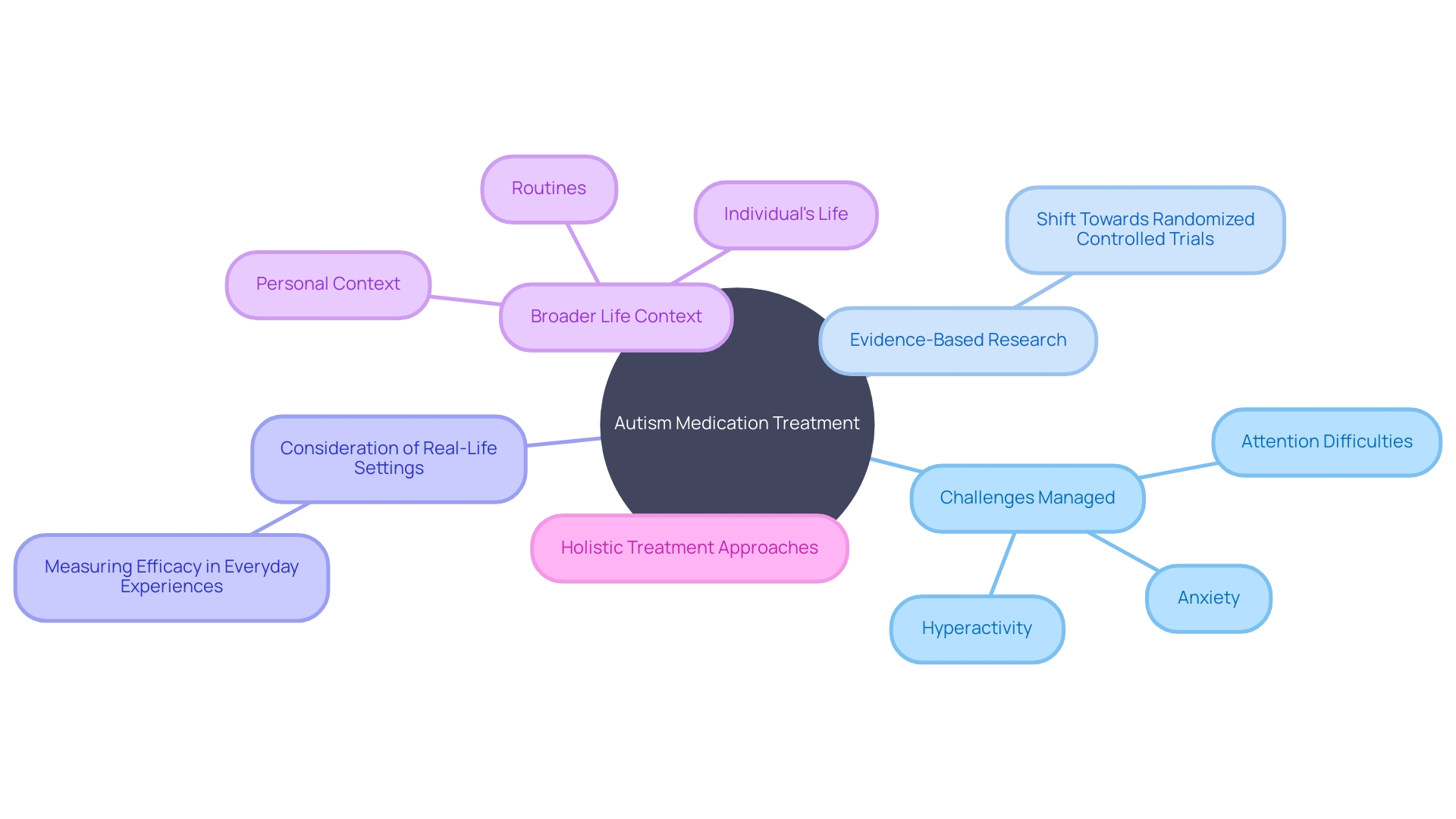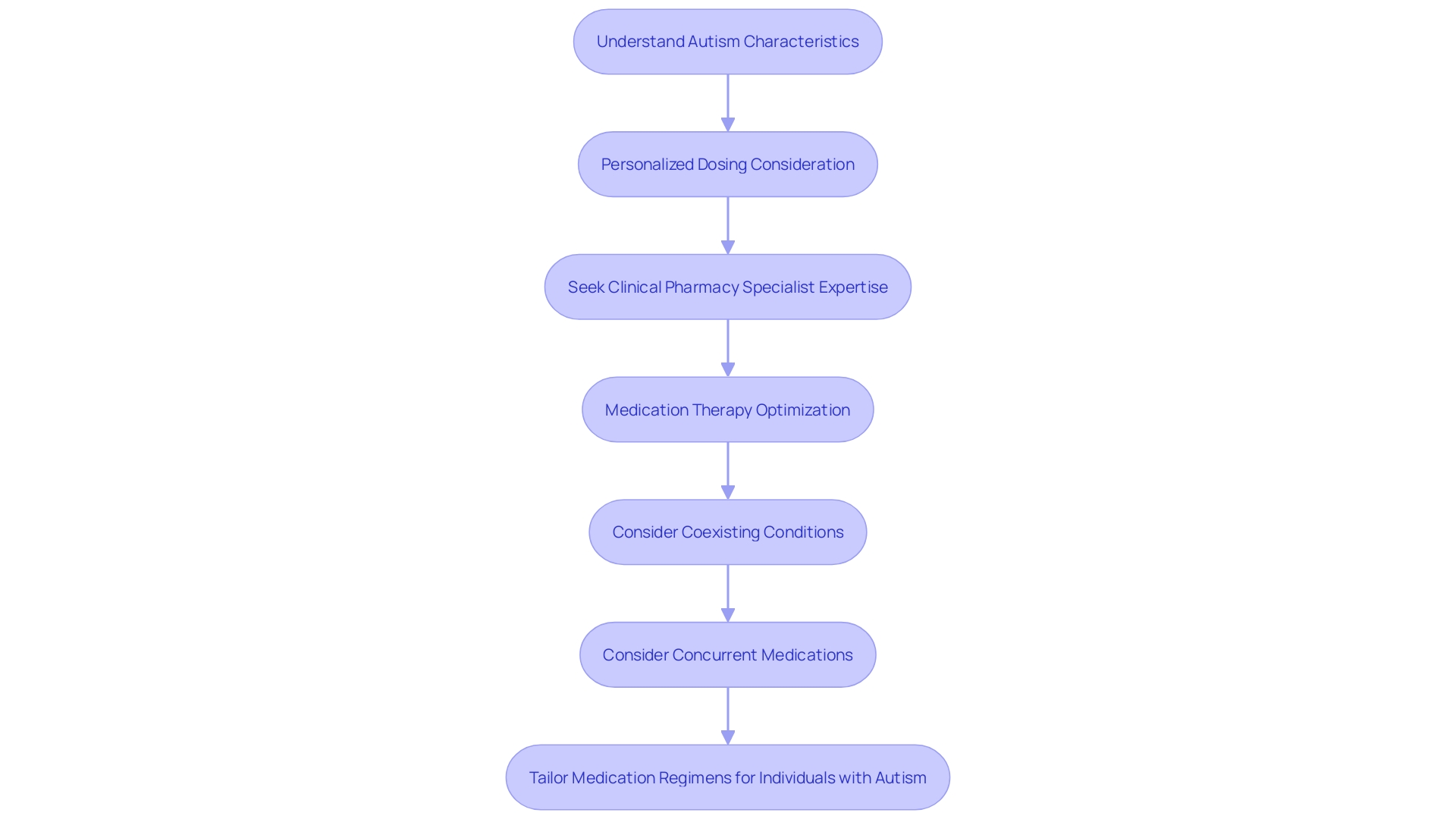Introduction
Understanding the Role of Medication in Autism Treatment
Understanding the role of medication in autism treatment is a multifaceted endeavor. While medication is not a panacea, it can be instrumental in managing the specific challenges that come with autism.
These may include difficulties with attention, hyperactivity, or anxiety, which can hinder an individual's ability to benefit fully from therapies such as Applied Behavior Analysis (ABA), speech therapy, and occupational therapy. In light of evolving research methods, clinicians now rely on randomized controlled trials over quasi-experimental studies to gauge the effectiveness of interventions, ensuring that the chosen strategies are backed by robust evidence.
However, it is crucial to recognize that the efficacy of medication must be measured not just in controlled environments but in real-life settings that reflect the daily experiences of individuals with autism. As highlighted by a poignant reflection from the autism community, research and interventions must bridge the gap between controlled laboratory settings and the 'real life' where the nuances of everyday activities play a significant role in an individual's well-being. This perspective underscores the importance of contextualizing treatment approaches, including medication, within the broader tapestry of an individual's life, routines, and personal context. In doing so, we can strive towards fostering an environment that supports the flourishing of individuals with autism, not just by addressing symptoms but by enhancing their ability to navigate and thrive in the world around them.
Understanding the Role of Medication in Autism Treatment
Understanding the role of medication in autism treatment is a multifaceted endeavor. While medication is not a panacea, it can be instrumental in managing the specific challenges that come with autism.
These may include difficulties with attention, hyperactivity, or anxiety, which can hinder an individual's ability to benefit fully from therapies such as Applied Behavior Analysis (ABA), speech therapy, and occupational therapy. In light of evolving research methods, clinicians now rely on randomized controlled trials over quasi-experimental studies to gauge the effectiveness of interventions, ensuring that the chosen strategies are backed by robust evidence.
However, it is crucial to recognize that the efficacy of medication must be measured not just in controlled environments but in real-life settings that reflect the daily experiences of individuals with autism. As highlighted by a poignant reflection from the autism community, research and interventions must bridge the gap between controlled laboratory settings and the 'real life' where the nuances of everyday activities play a significant role in an individual's well-being. This perspective underscores the importance of contextualizing treatment approaches, including medication, within the broader tapestry of an individual's life, routines, and personal context. In doing so, we can strive towards fostering an environment that supports the flourishing of individuals with autism, not just by addressing symptoms but by enhancing their ability to navigate and thrive in the world around them.

Types of Medications Used for Autism Symptoms
Navigating the landscape of medications for autism can be complex, with a range of options tailored to address diverse symptoms. These medications are not one-size-fits-all and must be carefully selected and managed by healthcare experts. Among the treatments, antipsychotics like risperidone are often utilized to reduce irritability and aggression.
SSRIs, which include fluoxetine, may be prescribed to manage symptoms of anxiety and depression. Stimulant medications, known for treating ADHD, can also be beneficial for some individuals with autism to improve focus and decrease hyperactivity. It's crucial to have ongoing discussions with medical professionals to ensure the best outcomes.
Selective Serotonin Re-uptake Inhibitors (SSRIs)
Selective Serotonin Reuptake Inhibitors (SSRIs) serve as a beacon of hope for those grappling with the invisible weight of anxiety and depression, conditions that are all too common in our society. With over 40 million American adults, or 19.1% of the population, facing the tumultuous waves of anxiety disorders, the role of SSRIs becomes crucial.
They operate by elevating serotonin levels in the brain, which is akin to turning up the brightness on a dimmed light, potentially lifting mood and easing the grip of anxiety. For individuals with autism, SSRIs may also be a key in managing the intense and often debilitating symptoms such as obsessive-compulsive behaviors.
This is particularly pertinent considering that a staggering 50% of young adults, from ages 18 to 24, report experiencing symptoms of anxiety or depressive disorders. The gender disparity in anxiety disorders is also notable, with women being twice as likely to be affected compared to men. Despite the high prevalence and the profound impact of anxiety disorders, it's concerning that more than 60% of those suffering do not seek treatment. In understanding the benefits of SSRIs, it's hoped that more individuals will reach out for the support that can lead to a brighter, more manageable day-to-day experience.
Tricyclics
Tricyclic medications are another class of antidepressants that may be prescribed to individuals with autism. They work by affecting the levels of certain neurotransmitters in the brain, which can help improve mood and reduce symptoms of depression. Tricyclics may be used to manage symptoms such as irritability, aggression, or mood swings in individuals with autism.
Psychoactive or Anti-Psychotic Medications
Psychoactive or anti-psychotic medications may be prescribed to individuals with autism who exhibit severe behavioral symptoms, such as aggression, self-injury, or hallucinations. These medications can help manage symptoms by affecting brain chemicals that influence behavior and mood. It is important to note that these medications should be used under close supervision and regular monitoring by a healthcare professional.
Stimulants
Stimulant medications, such as methylphenidate or amphetamines, are commonly used to treat symptoms of attention deficit hyperactivity disorder (ADHD). Some individuals with autism may also have a co-occurring diagnosis of ADHD, and stimulant medications can help manage symptoms such as impulsivity, hyperactivity, and inattention.
Anti-Anxiety Medications
Navigating the complexities of autism, healthcare professionals may introduce anti-anxiety medications to alleviate significant anxiety symptoms in individuals with autism. These medications aim to diminish the distressing feelings of anxiety, fostering a more serene state of mind. However, it's crucial to understand that such medications are not a standalone solution for autism and are most effective when integrated into a broader treatment strategy.
Statistics reveal the pervasive nature of anxiety disorders, impacting over 40 million adults in the U.S., which is about 19.1% of the population. Specifically, Generalized Anxiety Disorder (GAD) affects 6.8 million adults. Anxiety's grip is tighter among the young, with nearly half of those between 18 and 24 years old experiencing symptoms.
This mental health challenge shows a gender disparity as well, with women being twice as likely to suffer from anxiety disorders. Despite the high treatability of anxiety disorders, an astounding 60% of those affected do not seek professional help. This underscores the importance of guided, professional management of anti-anxiety medications within the autism care regimen.

Anticonvulsants
Anticonvulsant medications, also known as anti-seizure medications, may be prescribed to individuals with autism who have seizures or epilepsy. These medications work by stabilizing electrical activity in the brain and can help reduce the frequency and severity of seizures. It is important for individuals with autism who are prescribed anticonvulsant medications to be closely monitored by a healthcare professional.
Creating a Medication Plan
When devising a medication strategy for autism, it's crucial to foster a team approach, bringing together healthcare professionals, parents or caregivers, and other pivotal members of the treatment team. This collaborative effort ensures that the medication regimen is finely tuned to address the unique symptoms and needs of the individual, as well as any accompanying conditions.
Goals for medication use should be crystal clear, and the impact of the medication on the individual should be meticulously tracked. Adjustments to the treatment plan should always be made with professional healthcare oversight, in adherence to the standards set by the FDA to guarantee the safety, effectiveness, and security of the medications being used.
Things to Remember About Medication
Navigating the complexities of medication for autism requires a thoughtful approach. It's crucial for those making decisions to understand that autism's unique characteristics can influence medication efficacy and safety. A clinical pharmacy specialist, with years of experience in internal medicine, emphasizes the importance of personalized dosing.
They explain that even seasoned prescribers might not always be equipped with the specialized knowledge to adjust doses for special populations, attributing this not to oversight but to the sheer breadth of information required in their roles. The pharmacist's role, therefore, becomes essential in ensuring that medication regimens are tailored to individual needs, considering any coexisting conditions and concurrent medications. When in doubt, seeking expertise from those specialized in medication therapy optimization can provide the necessary guidance to ensure safe and effective treatment.

Controversies and Concerns Surrounding Medication Use
Navigating the landscape of autism treatment options can be complex, with the use of medication often at the forefront of discussions among healthcare professionals, researchers, and families. Decisions about medication are not taken lightly, especially considering the delicate balance between potential benefits and the risk of side effects or long-term impacts.
The move towards evidence-based practice in autism care has seen a shift from quasi-experimental studies to more rigorous randomized controlled trials, enhancing the validity of research outcomes. Despite advancements, a critical look at non pharmacological intervention studies reveals design flaws impacting our ability to fully understand their effectiveness and potential risks.
This underscores the necessity for healthcare providers and families to engage in comprehensive evaluations of interventions, weighing the latest research findings against individual needs. As we strive to uphold high standards in healthcare, it is essential to maintain a dialogue that is informed by current studies and inclusive of the voices of those affected by autism. This collaborative approach ensures that interventions, whether medicinal or not, are scrutinized for their potential to truly benefit the autism community without causing undue harm.
Finding the Right Medication
Finding the right medication for an individual with autism may require some trial and error. It is important to work closely with a healthcare professional who specializes in autism and has experience with medication management.
The healthcare professional will consider the individual's specific symptoms, needs, and any co-occurring conditions to determine the most appropriate medication. Regular monitoring and communication with the healthcare professional are essential to ensure the medication is effective and well-tolerated.

Conclusion
In conclusion, medication plays a crucial role in managing the specific challenges faced by individuals with autism, such as attention difficulties, hyperactivity, and anxiety. While not a cure-all, medication can complement therapies like ABA, speech therapy, and occupational therapy.
Clinicians now rely on evidence-based approaches, using randomized controlled trials to assess the effectiveness of interventions. It's important to measure medication efficacy in real-life settings that reflect the daily experiences of individuals with autism.
Different types of medications are used for autism symptoms, including antipsychotics for irritability and aggression, SSRIs for anxiety and depression, stimulants for ADHD symptoms, and anti-anxiety medications. Tricyclics and anticonvulsants may also be prescribed based on individual needs.
Creating a medication plan requires collaboration among healthcare professionals, parents/caregivers, and the treatment team. Clear goals should be established and the impact of medication closely monitored under professional oversight.
Understanding that medication efficacy can be influenced by autism's unique characteristics is important. Seeking expertise from professionals specializing in medication therapy optimization ensures safe and effective treatment. Controversies surrounding medication use emphasize the need for comprehensive evaluations of interventions informed by research findings and inclusive of those affected by autism. Finding the right medication may involve some trial and error. Close collaboration with an autism-specialized healthcare professional is essential for personalized management. By understanding the role of medication within an individual's life context, we can create an environment that supports individuals with autism in thriving in their daily lives.




